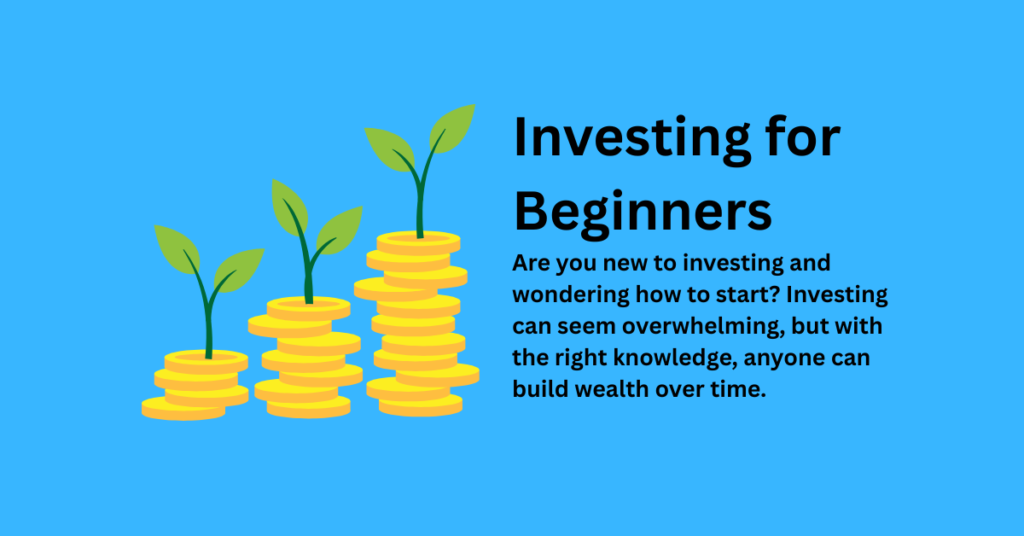
Are you new to investing and wondering how to start? Investing can seem overwhelming, but with the right knowledge, anyone can build wealth over time. Whether you’re looking to grow your savings, plan for retirement, or achieve financial freedom, investing is a powerful tool.
In this guide, we’ll break down the basics of investing for beginners, covering different investment options, risk management, and essential tips to make informed decisions.
Your goal determines your investment strategy. For help with defining your financial objectives, see our guide on Setting Financial Goals.
What is Investing?
Investing is the process of putting money into assets like stocks, bonds, real estate, or mutual funds to generate returns over time. Unlike saving, which keeps money idle, investing helps your money grow through capital appreciation, dividends, or interest.
Investing is the process of putting money into assets like stocks, bonds, real estate, or mutual funds to generate returns over time.
Why Should You Invest?
- Wealth Building: Investing helps your money grow faster than traditional savings.
- Inflation Protection: Investments like stocks and real estate can outpace inflation.
- Retirement Planning: Long-term investments secure your financial future.
- Passive Income: Dividend stocks and real estate provide steady income streams.
Different Types of Investments
1. Stocks
Stocks represent ownership in a company. When you buy a stock, you become a shareholder and can benefit from price appreciation and dividends.
Pros: High returns potential, ownership in companies. Cons: Market volatility, risk of loss.
2. Bonds
Bonds are fixed-income investments where you lend money to governments or corporations in exchange for periodic interest payments.
Pros: Stable income, lower risk than stocks. Cons: Lower returns, interest rate fluctuations.
3. Mutual Funds & ETFs
Mutual funds and Exchange-Traded Funds (ETFs) pool money from multiple investors to invest in a diversified portfolio of stocks or bonds.
Pros: Diversification, professional management. Cons: Management fees, potential lower control.
4. Real Estate (H3)
Investing in properties for rental income or resale can be a great long-term wealth-building strategy.
Pros: Tangible asset, steady cash flow. Cons: High upfront cost, maintenance expenses.
How to Start Investing as a Beginner
Step 1: Define Your Investment Goals
Are you investing for short-term gains, long-term wealth, or retirement? Your goal determines your investment strategy.
Step 2: Understand Risk Tolerance
Investments come with risks. Higher returns usually mean higher risk. Assess how much risk you’re comfortable taking.
Step 3: Choose the Right Investment Platform
Consider platforms like:
Step 4: Start with Index Funds or ETFs
If you’re unsure where to invest, index funds and ETFs are great beginner-friendly options with built-in diversification.
Step 5: Diversify Your Portfolio
Don’t put all your money into one investment. Spread investments across stocks, bonds, and real estate.
Step 6: Monitor & Rebalance Regularly
Check your investments periodically to ensure they align with your goals and risk appetite.
Common Investing Mistakes to Avoid
- Investing Without Research: Understand what you’re investing in before putting in money.
- Chasing Hot Stocks: Avoid following trends blindly.
- Ignoring Diversification: Spreading risk is key to stability.
- Timing the Market: Invest consistently instead of waiting for the perfect moment.
Best Investment Apps for Beginners
- Zerodha – Low-cost trading and investing.
- Groww – User-friendly mutual fund and stock investing.
- Upstox – Best for active traders.
FAQs on Investing for Beginners
1. How much money do I need to start investing? You can start with as little as ₹500 in mutual funds or ₹100 in stocks.
2. Is investing risky? Yes, but diversifying and choosing stable assets can reduce risks.
3. Which investment is best for beginners? Index funds, ETFs, and blue-chip stocks are great for beginners.
4. How long should I stay invested? Investing is a long-term game. The longer you stay invested, the better your returns.
5. Can I lose all my money in investing? If you invest wisely and diversify, the chances of losing everything are low.
Investing for beginners doesn’t have to be complicated. Start small, stay consistent, and make informed choices. The key is patience and discipline. Are you ready to start your investment journey? Open an investment account today and take the first step toward financial freedom!

For Advertising, Guest Posting, Newsletter Inserts please contact [email protected]. For general enquiries contact [email protected].
Recent Posts
Important Bank Holiday Trading Hours Update – January & February 2026
Tata Power-DDL launches Solar Sakhi Abhiyan
Next-Gen GST Reform: A Historic Diwali Gift for the Nation
Angel One Stock Broker Review
Income Tax Alert: ITR Filing Last Date for FY 2024-25 (AY 2025-26)
TikTok in India: The Buzz, the Ban, and What’s Really Happening
Wordle Answer Today (August 20, 2025): Hints and Full Solution Explained
Google Expands Store in India and Faces Global Play Store Challenges
Ola Electric Shares Recover Strongly After Heavy Fall in 2025
Gold Price Today: Rates Fall as Strong Dollar Impacts Market
Shreeji Shipping Global IPO Sees Strong Demand, GMP Suggests Listing Gains
India Approves ₹62,000 Crore Deal for LCA Tejas Mark 1A, HAL Shares Gain